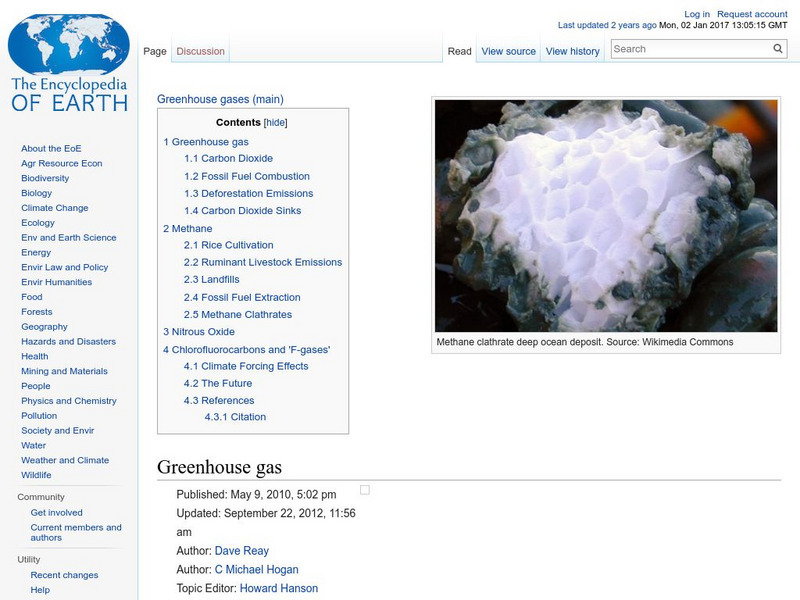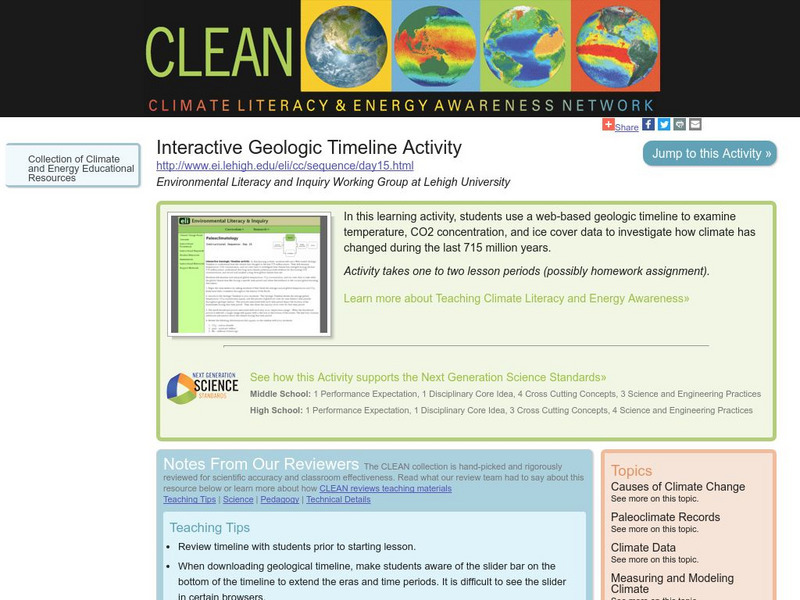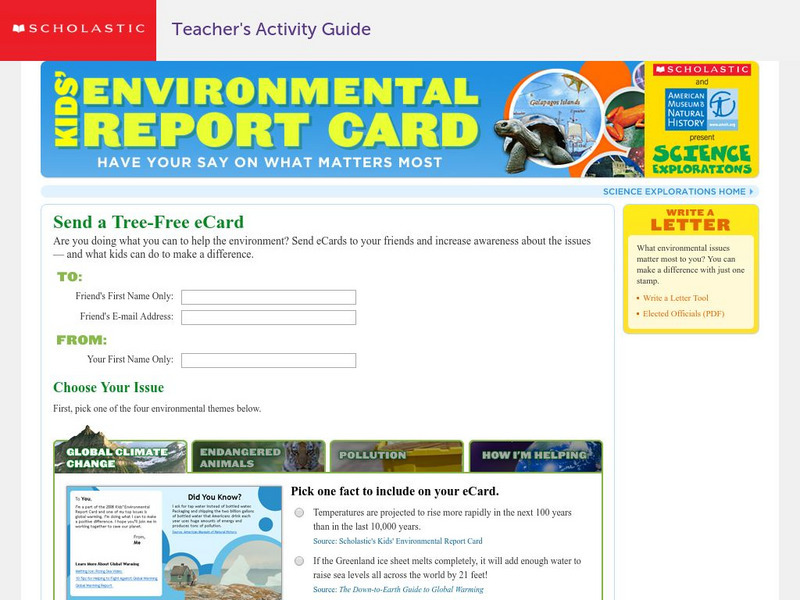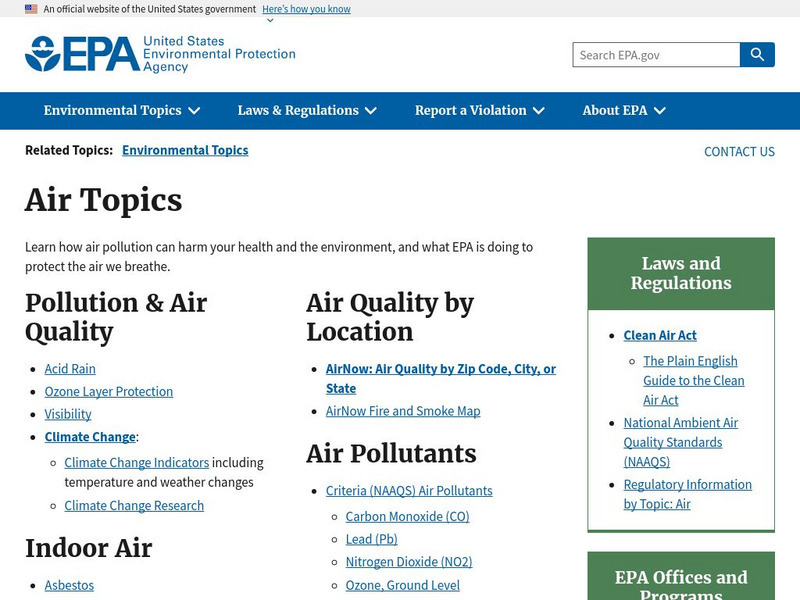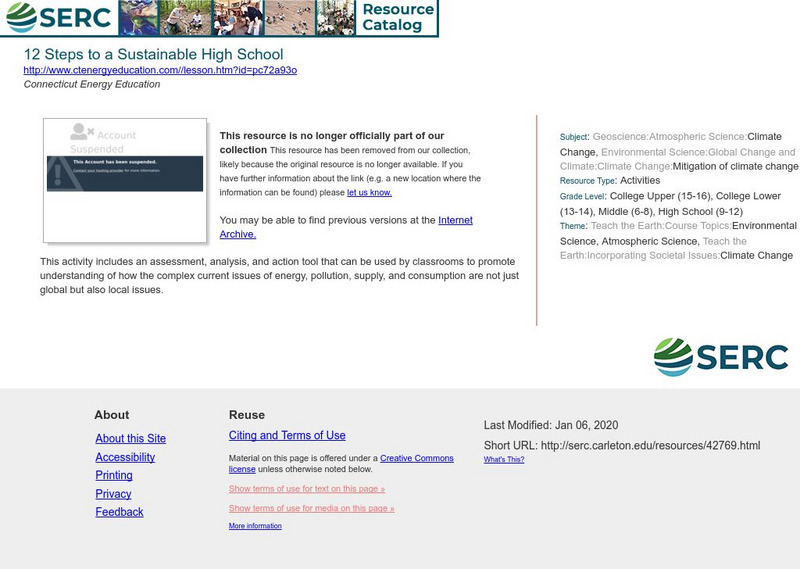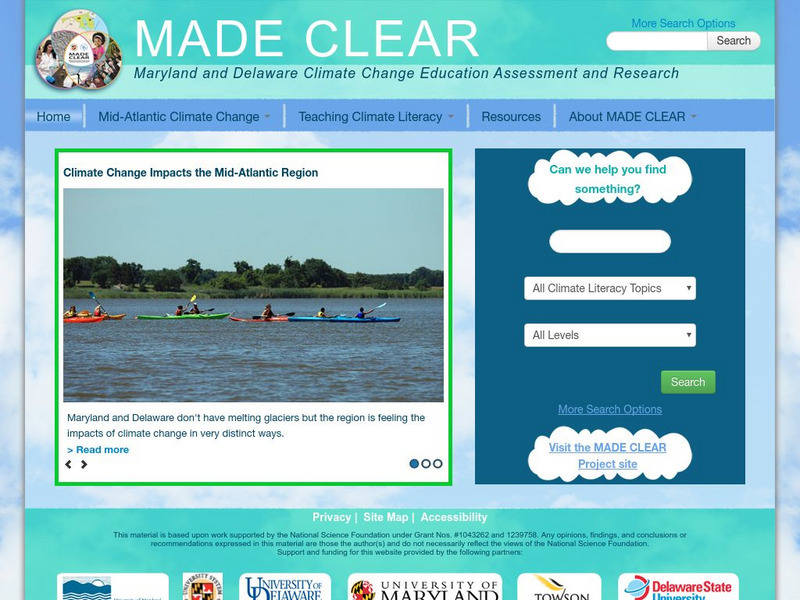Encyclopedia of Earth
Encyclopedia of Earth: Greenhouse Gas
Explains what greenhouse gas is, how the greenhouse effect works, and the history of fossil fuel combustion. Causes of other damaging greenhouse gases, including methane, nitrous oxide, chlorofluoracarbons, hydrofluorocarbons, and...
NASA
Nasa: Earth Observatory: The Carbon Cycle
Learn about the element carbon and its importance on the Earth's atmosphere and sustainability of life on the planet. Additionally, understand the role the carbon cycle plays in global climate change over time.
University Corporation for Atmospheric Research
Ucar: Little Ice Age: Blooming Thermometers
In this lesson, students develop an understanding of the relationship between natural phenomena, weather, and climate change, the study known as "phenology." In addition, they learn how cultural events are tied to the timing of seasonal...
University Corporation for Atmospheric Research
Ucar: Torrents, Droughts, and Twisters Oh My!
Students review what scientists know and what they're working to understand about the relationship between extreme weather events and climate change.
NASA
Climate Kids: What Do All These Graphs Mean?
Learn how to make, read and interpret a graph based on information regarding climate change. Understand the need to think globally and to take action!
Geography 4 kids
Geography4 kids.com: Variety Is the Spice of Climate
To every thing there is a season. Understand the role climate plays in the change of seasons across the United States.
Science Buddies
Science Buddies: Swimming in Acid: Understanding Ocean Acidification
The oceans are a precious natural resource, part of Earth's carbon cycle. But what happens if the oceans absorb too much carbon dioxide? Many scientists are concerned that the increased absorption of carbon dioxide is causing them to...
Society for Science and the Public
Science News for Students: Earth Breaks Heat Record for Third Year Straight
Climate change and heat from a strong El Nino played roles in making 2016 the hottest year on record. Understand the specific impacts of climate change.
Climate Literacy
Clean: Carbon Cycle Game
In this interactive, regionally-relevant carbon cycle game, students are challenged to understand the role of carbon in global climate change. They imagine that they are carbon molecules and travel via different processes through carbon...
Climate Literacy
Clean: Interactive Geologic Timeline Activity
In this learning activity, students use a web-based geologic timeline to examine temperature, CO2 concentration, and ice cover data to investigate how climate has changed during the last 715 million years. Students will gain an...
Government of Canada
Canadian Space Agency: Cloud Sat Looking at Clouds in 3 D
Learn about the mission of ClourSat, a satellite that will gather data as part of a comprehensive study of clouds to help develop a better understanding of the effect of clouds on climate . It will examine their structure, frequency and...
PBS
Pbs Learning Media: Albedo Decrease Linked to Vanishing Arctic Sea Ice
Examine this visualization by NASA to understand how the warming of the Arctic region has caused the sea ice extent to decline by 40%, thereby throwing our earth's energy budget off balance. Extensive resources included are teaching...
Choices Program, Brown University
Choices: Teaching With the News: Global Environment: Considering u.s. Policy
Through videos and handouts, learners gain a better understanding of what U.S. policy should be concerning global environmental issues. They willexplore four divergent policy options on the question of U.S. global environment policy and...
Story Behind the Science
Story Behind the Science: Realization of Global Warming [Pdf]
Article describing the history of how scientists developed their current understanding of global warming. It discusses why it is difficult for some people to accept that human beings have caused the Earth to warm, without controlled...
Science Education Resource Center at Carleton College
Serc: Lab 7: A Year in the Life of the Earth System
An investigation that is part of a series of lab lessons that expose students to Earth Systems through research, data, and visualizations. In this lab, students will observe how the Earth has changed over time to understand the Earth as...
Other
Royal Geographical Society: Discovering Antarctica
Resource-rich website will help students understand the challenges that Antarctica faces, the history of its exploration and the relationship between Antarctica and the rest of the world. Activities reveal insights about how it feels to...
Scholastic
Scholastic: Science Explorations: Kids' Environment Report Card
Cast your vote on the important environmental issues. Associated with each issue, there are at least three links to sites which can further your understanding of the issue. To encourage others to respect the environment, you can also...
US Environmental Protection Agency
Epa: Learn the Issues: Air
Air pollution occurs both inside and outside and is dangerous to individuals as well as to the planet. The Environmental Protection Agency oversees laws and regulations related to air quality and has gathered a wealth of information to...
Climate Literacy
Clean: 12 Steps to a Sustainable High School
This activity includes an assessment, analysis, and action tool that can be used by classrooms to promote understanding of how the complex current issues of energy, pollution, supply, and consumption are not just global but also local...
University of Wisconsin
The Why Files: Energy at the Earth's Poles
A resource to help understand how the amount of energy at the Earth's poles affects polar conditions.
University of Illinois
University of Illinois Extension: Tree House Weather Kids: Seasons and Temperature: Greenhouse Effect
Animated resource helps young researchers understand what global warming and the greenhouse effect mean.
Thinkport Education
Made Clear: Quick Review: Sea Level Rise
How well do you understand the impacts of sea-level rise in the Mid-Atlantic region? Take this quick review to find out.
Science Education Resource Center at Carleton College
Serc: Lab 3: Land Ice
A lab experiment in a series of experiments that investigates climate and the cryosphere. Here you can learn about how glaciers form. Understand how glaciers offers scientist evidence for climate change. Lab includes both an online...
National Geographic
National Geographic: Human Impacts on the Environment
Humans impact the physical environment in many ways: overpopulation, pollution, burning fossil fuels, and deforestation. Changes like these have triggered climate change, soil erosion, poor air quality, and undrinkable water. These...


